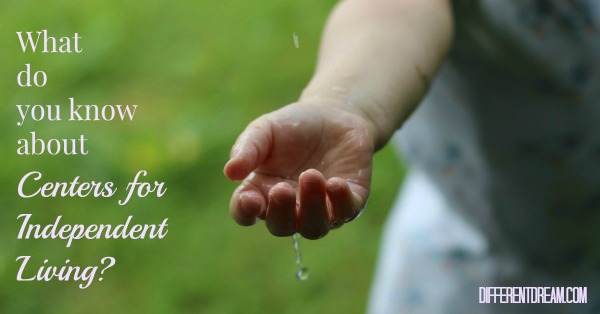Centers for Independent Living: A Special Needs Resource

Centers for Independent Living (CILs) have been around longer than the first federal special education law passed in 1974. Since ferreting out special needs resources always makes me smile, imagine the size of my grin after learning about them recently. And imagine my chagrin over not discovering this resource when doing the research for Different Dream Parenting: A Practical Guide for Raising a Child with Special Needs.
Centers for Independent Living: The Why of this Special Needs Resource
The CIL first came to my attention through SpecialEducationAdvisor.com. In the article What Are CILs and Why Should You Know About Them, Mary Mazzoni explains why the centers first formed. She says, “Centers for Independent Living (CILs) are non-profit community-based organizations that are run by people with all sorts of disabilities. CILs are an integral part of the Disability Rights and Independent Living Movements in this country.”
The article includes a list explaining why parents of children with special needs should take advantage of the center nearest them. From answering questions about resources about all aspects of life at every stage of life to participating in peer mentoring, the list convinced me of the importance of utilizing this valuable resource.
Centers for Independent Living: The What of this Special Needs Resource
Mazzoni goes on to explain what principles guide CILs. A few of them include:
- Civil Rights
- De-institutionalization
- Self-help
- Barrier-removal
- Advocacy
- Peer role models
The article also lists core services:
- Information and referral
- Individual and systems advocacy
- Peer mentoring
- Independent living skills training
Centers for Independent Living: How to Find this Special Needs Resource
You can find a list of CILs in the United States and its territories here, as well as a plethora of other resources for special needs individuals.
What Do You Know about CILs?
Have you dealt with a Center for Independent Living in your state? What was the experience like? Helpful? Frustrating? Do you recommend them or has another resource been more helpful? Leave a comment to share what you know.
Do you like what you see at DifferentDream.com? You can receive more great content by subscribing to the quarterly Different Dream newsletter and signing up for the daily RSS feed delivered to your email inbox. You can sign up for the first in the pop-up box and the second at the bottom of this page.
By Jolene
Jolene Philo is the author of several books for the caregiving community. She speaks at parenting and special needs conferences around the country. Sharing Love Abundantly with Special Needs Families: The 5 Love Languages® for Parents Raising Children with Disabilities, which she co-authored with Dr. Gary Chapman, was released in August of 2019 and is available at local bookstores, their bookstore website, and Amazon. See Jane Dance!, the third book in the West River cozy mystery series, which features characters affected by disability, was released in October of 2023.
6 Comments
Submit a Comment
Subscribe for Updates from Jolene
Related Posts
Experiencing Post-Traumatic Growth while Raising a Child with Disabilities
Jolene explains the benefits of experiencing post-traumatic growth while raising a child with disabilities.
Close to the Brokehearted
Guest blogger Karen Wright explains how the phrase “I’d like to buy you coffee” has been her go-to for initiating friendship.
Mending Broken Hearts
Guest blogger Kelly Denham explains how, in the midst of her grief, God proves He is in the business of mending broken hearts.






Aaran,
Thank you for those cautions. Any special need service providers need to be thoroughly researched and interviewed by parents or guardians. This is true whether or not the staff is certified. An entire chapter of my book, Different Dream Parenting: A Practical Guide to Raising a Child with Special Needs is dedicated to helping parents determine whether or not a care facility is a safe, healthy, and stimulating environment. Click the above “Buy the Book” tab to download a preview chapter and view the book trailer.
Jolene
I just learned of them in TN while doing a job search. The govt funded (Medicaid ) ones here are staffed by non-professionals who just have some training if I understand correctly. I’m not saying everyone should have higher Ed, but when it comes to the complications of quality of life for a person with such differences, I firmly believe in licensed or certified workers. I do NOT want my child living with anyone not equipped to do the job. They need to be at least as competent as her parents, i think. So, wherever you’re looking, some very specific questions need to be asked. Also, some will qualify for Long Term Care, so that can be researched as well; it’s a very broad umbrella that many services are under.
Amy, go to this link http://www.ilru.org/html/publications/directory/index.html and click on Colorado to get that state’s listing. Hope that helps.
Jolene
Do they have a list like this for Colorado
Dear Karen,
I’m sorry to hear about the lack of services for your son. That must be incredibly frustrating. You may need to become a squeaky wheel in order to be heard.
We live in Spring;Tx. And have not been able to find a suitable one for my 23yr old son that’s living with autism.